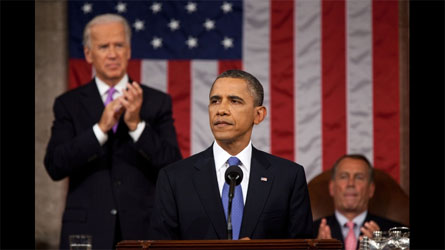Can Obama Jobs Plan Reduce Poverty in America?
America is fast emerging as a new poor country, as poverty here has been increasing at an alarming rate. According to U.S. Census Bureau data released Tuesday, September 13, 2011, the nation’s poverty rate rose to 15.1% in 2010, up from 14.3% in 2009 and to its highest level since 1993. That means nearly one in every six persons in America is poor today.
By Rakesh Raman
While political efforts – including President Barack Obama’s new jobs plan – are on, citizens are taking various steps to avoid a possible double-dip recession and bring economy back on track.
Catholic Charities USA (CCUSA), for example, in conjunction with nine leading nonprofit partners, planned the Inaugural National Poverty Summit on September 18 – 19 in Fort Worth, TX in an effort to further a nationwide movement to reduce poverty in America.
The event features a call to action by White House Domestic Policy Council Director Melody Barnes, as well as a keynote address by Mark Shriver, senior VP of US Operations for Save the Children.
[ Also Read: Catch the Corrupt: A Service for the Masses ]Organizing partners include: The American Human Development Project, Bread for the World, the Catholic Campaign for Human Development, CCUSA, the Corporation for Enterprise Development, the Coalition on Human Needs, Feeding America, the National Alliance to End Homelessness, Save the Children, and the Society of St. Vincent de Paul.
“The summit has been designed to launch a national conversation about poverty—one that will lead to action,” says Candy Hill, senior VP of Social Policy and Government Affairs at CCUSA. “We need to collectively re-imagine the way that America addresses poverty and develop stronger, sustainable strategies to reduce poverty.”
Moreover, hunger-relief charity Feeding America and the Ad Council launched a series of national public service advertisements (PSAs) featuring Matt Damon, Ben Affleck, and other actors, designed to motivate Americans to get involved in the fight against hunger. Walmart launched a “Fighting Hunger Together” Facebook campaign as part of the company’s $2 billion commitment to help fight hunger through 2015.
In a theatrical event, audiences in U.S. theaters watched “To Catch a Dollar: Muhammad Yunus Banks on America,” learning the story of the Nobel Laureate’s model of microfinance and how it is changing lives in the United States through the nonprofit organization, Grameen America.
But what is poverty? Currently, a U.S. family of four is below the poverty line if their total annual income is less than $22,350. Going by this yardstick, most Americans (58.5%) are likely to spend at least one year below the poverty line at some point between ages 25 and 75.
[ Also Read: RMN Community Court Service for Online Justice ]Meanwhile, President Obama is presenting his $447 billion jobs plan to give some quick relief to the jobless, a step to combat poverty. However, his plan is unlikely to work, as he is trying to provide artificial respiration to the dying economy without thinking about a sustainable remedy.
And the official hypothesis that after earning money from their jobs, people will spend, lacks logic. People won’t spend; they will save for the future as they have already seen some real bad days. And this time, the savings will be inside their homes, not even in the banks.
The chances of failure for the jobs plan are more now because in the near term horizon to 2015, the U.S. net general government debt is projected to be $14.5 trillion (79% of 2015 GDP). The new jobs plan will add to this mounting burden while Standard & Poor’s Ratings Services has lowered its long-term sovereign credit rating on the USA to ‘AA+’ from ‘AAA’.
As the economy continues to deteriorate, a May 2011 poll said that 45% of Americans give the President positive ratings for the overall job he is doing while 55% give him negative ratings, though these ratings keep fluctuating depending on researcher, sample selection, survey methodology, and so on.
Still, President Obama needs to take some hard decisions to provide necessary strength to the weak economy. For example, instead of providing jobs to the unemployed at the cost of the government exchequer, Obama administration should work with the industry to devise innovative business models that could encourage entrepreneurship and give strength to overall business environment.
The government can take cue from recent IBM initiative. Tech major IBM has decided to provide $1 billion in financing to help credit-qualified small and medium businesses (SMBs) over the next 18 months.
Moreover, the priority should be to enhance worker productivity in the current always-on business environment. There is an immediate need for corporations recovering from the recessionary onslaught to change some critical rules of the game at workplace. And instead of erecting trade barriers, government should encourage trade with liberal immigration laws to get cheaper workforce in the U.S. to keep American businesses competitive in the global marketplace.
Although Obama’s jobs plan promises tax cuts to businesses hiring local people, most will still be reluctant to chew this bait. It will be suicidal for them to hire new people when their business does not demand it. They can still take a risk with cheaper workforce from outside that they can employ at a fraction of the cost on hiring expensive American workers. But President Obama needs to teach local people how to conquer xenophobia.
Likewise, in a true global village style, Americans should be encouraged to go out and work in emerging countries so that local American companies can feel relieved from this avoidable pressure to hire more people. Today, the success mantra for American businesses is to do more with less. They should keep their operations as lean as possible. So they would and they should avoid any hiring even under the new jobs plan.
After all, employment generation is supposed to be determined by market forces and not by political bosses. Playing against the market forces can bring disastrous consequences.
So, the Obama administration must take some long-term, prudent policy decisions instead of relying on frail quickfix solutions like the jobs plan. Only then America can hope to see the good old days again.
By Rakesh Raman, the managing editor of Raman Media Network.
Photo courtesy: www.whitehouse.gov




